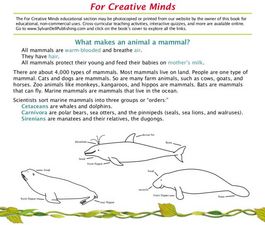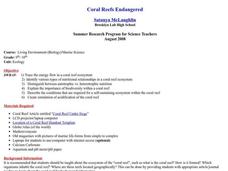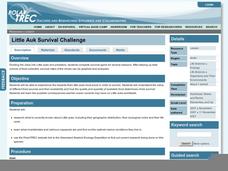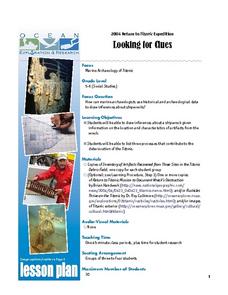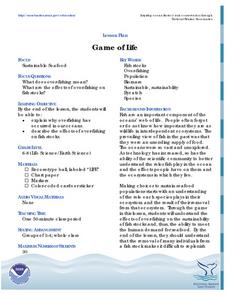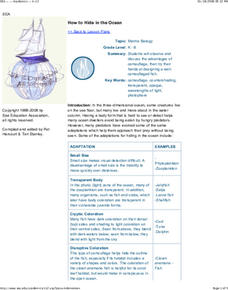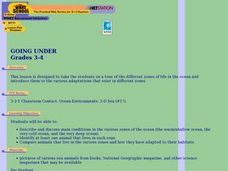Curated OER
Pollution Solution
Students, after discussing oil pollution, generate solutions to an oil spill.
Curated OER
Food Web Mystery
Students describe typical marine food webs, and explain why food is generally scarce in the deep-ocean environment. They discuss reasons that seamounts may support a higher density of biological organisms than would appear to be possible.
Florida International University
Are You Concentrating?
Explore the importance of a concentration gradient in the rates of dissolution. Using the ocean ecosystem, learners study rates of dissolution around coral reefs. A hands-on experiment helps individuals discover the effects of changing a...
Curated OER
Small Wonders
Learners investigate some of the 'mysteries' of the animal, marine and insect worlds, and create student books explaining their findings to younger students.
Curated OER
Sea Activities
Students explore the sea. In this biology lesson plan, student investigate sea creatures, and sea water. Students discover how to convert sea water into fresh drinking water as well.
Curated OER
Shipwreck Alley
Students examine the different types of vessels used in commercial shipping. In this commercial shipping lesson students apply force and motion to problems of marine safety.
Curated OER
The Iron Cheesebox
Students describe the oxidation/reduction reactions that are involved in the corrosion of iron in seawater. In this marine sanctuary lesson students study the steps in conserving marine archaeological artifacts.
Curated OER
For Creative Minds: What Makes an Animal a Mammal?
Students read about categories of mammals and their features. Students then construct a marine animal, using given print outs in the lesson. Students then create adaptations for their mammal, using a web site reference for guidance.
Curated OER
Coral Reefs Endangered
Learners identify different types of nutritional relationships in a coral reef system and trace the energy flow. In this marine biology lesson students create a simulation of acidification of the coral reef.
Curated OER
Conductivity - Pass the Buoy and Pepper, Please
Buoys around our coastlines are equipped with sensory devices which monitor temperature, salinity, and water pressure. Emerging earth scientists examine some of this data and relate salinity to the electrical conductivity of the surface...
Florida International University
Counting FishStix
How do we count the fish in the ocean? An engaging lesson models how to estimate fish populations with observational surveys. Class members begin by studying the behavior of fish on the coral reef in the oceans. They then become the fish...
Ocean Explorer
Architects of the Coral Reef
Coral Reefs are the focus of a life science lesson plan. Upper graders look at how coral reefs are formed, how the animals and plants reproduce, and the variety of ways that humans benefit from coral reefs around the world. Groups of...
Curated OER
Little Auk Survival Challenge
A bird's life is one of danger and intrigue as it struggles for survival in sometimes harsh environments. To understand how difficult surviving in the wild can be, children play a simulation game where they act as little auks, birds from...
Curated OER
Fisheries And Songs
Young scholars view examples of songs that have the ocean and its life as their themes. After hearing and reading them, students write their own, having done research on the social and political issues of the ocean's environment.
Curated OER
My Friend, The Volcano
Students describe the positive impacts of volcanic activity on marine ecosystems. In this volcano lesson students explore the process that causes volcanic activity along the Mariana and Kermadec Island Arcs.
Curated OER
Titanic: Looking for Clues
Young scholars make inferences about a shipwreck based on the location of artifacts. They role play as marine archaeologists and list three processes that contribute to the deterioration of the Titanic.
Curated OER
The Inside Current
Eighth graders explore ocean currents and wind patterns. They discover the concept of systems to show how change in one component of a body of water, causes change in other components in that system. Students describe positive and...
Curated OER
Game of Life
By playing this game, students discover what happens to a fish stock when large amounts disappear.
Curated OER
Ocean Habitats:
Students investigate the creatures of intertidal zones. They explore the adaptations species make to survive .
Curated OER
Ocean Exploration
Students explore whales. In this animal adaptation and whale instructional activity, students access prior knowledge about whales from previous lessons, then use background knowledge to predict the eating strategies of a baleen whale and...
Curated OER
How to Hide in the Ocean
Learners observe the advantages of camouflage. They design a well camouflaged fish of their own.
Curated OER
Global Warming: Life in a Greenhouse
Students investigate the evidence and consequences of global warming. They read and discuss an article, conduct a debate, evaluate their community's climate statistics, log their gas consumption for a week, and develop a panel discussion...
Curated OER
A Bioluminescent Gallery
Students examine the different types of luminescence in deep sea organisms. In this bioluminescence lesson, students investigate how color and light aide deep ocean organisms by describing the characteristics of the habitat and...









